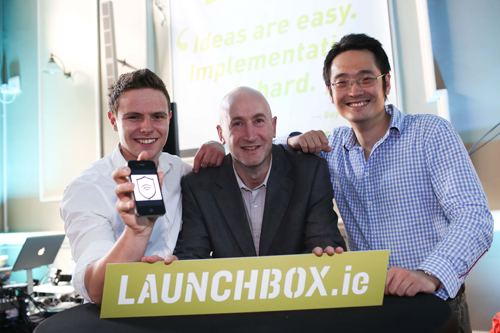Students Pitch for Investment Under College Initiative for Start-Ups
Posted on: 02 September 2013
RTE Radio 1, Morning Ireland, Wednesday, August 14, 2013, College students forsake holidays to develop business ideas
Students at Trinity College Dublin recently pitched for investment in their campus business ventures under a new programme, LaunchBox, aimed at cultivating the next generation of job creators.
Under the programme, six teams of students have spent the last three months incubating business ideas at LaunchBox headquarters in Regent House, located above the famous front arch of Trinity College. The teams were provided with seed funding, office space and master classes in marketing and funding. At an event held in Regent House teams showcased their ideas in a business pitch format to the business and college community.
The pilot programme, which aims to foster entrepreneurial spirit and support students to develop investor-ready ventures, has been supported by the University of Dublin Fund (USA) and Trinity Angels, business leaders making up a network of Trinity alumni and friends, who have invested €100,000 in the student entrepreneurs.

Dean of Research at Trinity, Professor Vinny Cahill pictured with WifiGuard team members Oisín O’Sullivan and Guoxian Yang
The Trinity Angels were also on hand to provide expert advice and mentoring to the students during the programme. The Angels are Sean Blanchfield, founder of Demonware; Brian Caulfield, partner at venture capital firm DFJ Esprit; Stuart Coulson, co-founder of Gradient Solutions; Paul Duffy, Chairman and CEO of The Absolut Company; Terry Gallagher, private investor in the US and Ireland; Joey Mason, partner at Delta Partners; Shane Naughton, technology entrepreneur based in New York; John Ryan, co-founder of Macrovision; Beate Schuler, former owner of Iropharm and Fiona Thomas, Director of the Gowan Group Limited.
The teams were funded for the three months that they spent in Regent House, and allocated additional expenses they needed for their projects. This funding came directly from the Trinity Angels through a philanthropic model which ensures the students retain complete control over their ventures.
Products that have been incubated under the LaunchBox programme include WifiGuard, which uses a household wifi to detect home intruders; Food Cloud, an ‘app’ that facilitates the donation of unused food to local charities; and BiteLock, a new type of bicycle lock, designed to immobilise a bicycle in an attempted theft.
Speaking about the programme, Dean of Research at Trinity, Professor Vinny Cahill said: “Trinity College with our long tradition of bridging the academic and enterprise communities, is committed to educating students not just to get a job but to create jobs too. LaunchBox fosters that culture of entrepreneurship by creating an environment for students to tap into the enterprise ecosystem and use their creativity to turn ideas into jobs.”
LaunchBox Teams
AdMe – Sebastien Penot, Orme de Saint Hilaire, James Walsh, Daniel Cooney, Augustin de Pelleport, Thomas Cullen: The AdMe app is designed to help college society organisers sign up new members, organise events and collect money. It also enables Freshers to access the full extent of what university has to offer, on the go, at their fingertips.
BiteLock – Brian Higgins and John Hickey: BiteLock is a new type of bicycle lock designed to immobilise a bicycle in an attempted theft. Currently in prototype, the goal is large-scale manufacture.
Food Cloud – Alex Sloan, Emma Mooney and Iseult Ward: Foodcloud is a social enterprise which reduces food waste in the commercial sector by connecting retailers with excess products to charities in need through a smartphone “app”.
Synthetech – Eric Risser and Wenyi Sun: Synthetech is creating new art tools for the computer graphics industry, automating the tedious and time-consuming side of digital art. Artomatic, their flagship program, creates many subtly different textures for 3D models from a single input.
WifiGuard – Guoxian Yang and Oisín O’Sullivan: WifiGuard takes a household wifi signal and analyses its shape. Wifi bends when it hits an object and WifiGuard use this to detect home intruders. They’re looking for additional funding to move to the next phase.
Writing for Tiny – Gail Condon and Nicola Davis: Writing for Tiny publishes books designed to communicate both everyday and difficult issues to children. Based on a clinical approach and hand-tailored for each child, the books are fully illustrated.
Media Coverage:
-
RTE Radio 1, Morning Ireland, Wednesday, August 14, 2013, College students forsake holidays to develop business ideas
- Siliconrepublic.com, Sunday, August 25, 2013, Tech start-up of the week: FoodCloud
For media queries please contact Fiona Tyrrell, Press Officer for the Faculty of Arts, Humanities and Social Sciences, Trinity College Dublin at tyrrellf@tcd.ieor Tel: + 353 1 8964337
